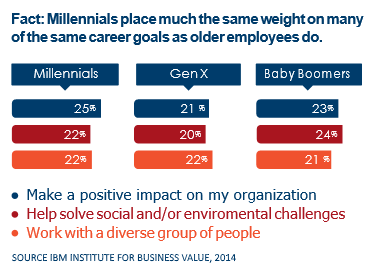By Garland Brooks, Business Enablement & Sales Optimization, Dell EMC/Dell Financial Services. Edited by Alexandra Dressman, Sales Coordinator 3 AVP, Huntington Equipment Finance, and Jon Gerson, President, Executive Solutions for Leasing & Finance, Inc. All are members of the ELFA Emerging Talent Advisory Council.
 June 4, 2019 - Millennials are likely the most studied generation in history, or so would claim the mountain of research analyzing how younger workers are different (or maybe not so different) from previous generations. Within many American companies, non-Millennial executives, leaders, marketers and co-workers are talking about Millennials and their behaviors, attitudes and beliefs. They want to understand how this generation thinks differently than they do and apply this understanding to create more engaged employees. In a panel discussion moderated by Nathan Gibbons, COO at Innovation Finance, held at the ELFA 57th Annual Convention, this topic was explored by pointing specific questions toward a panel of Millennials from ELFA’s Emerging Talent Advisory Council.
June 4, 2019 - Millennials are likely the most studied generation in history, or so would claim the mountain of research analyzing how younger workers are different (or maybe not so different) from previous generations. Within many American companies, non-Millennial executives, leaders, marketers and co-workers are talking about Millennials and their behaviors, attitudes and beliefs. They want to understand how this generation thinks differently than they do and apply this understanding to create more engaged employees. In a panel discussion moderated by Nathan Gibbons, COO at Innovation Finance, held at the ELFA 57th Annual Convention, this topic was explored by pointing specific questions toward a panel of Millennials from ELFA’s Emerging Talent Advisory Council.
The panel began with Nate sharing a bit of comic relief from a “Saturday Night Live” episode showcasing extreme Millennial behavior and an article recently written in the New Yorker. The article described Millennials as tolerant, confident, open-minded and ambitious, but also disengaged, narcissistic, distrustful and anxious. It was intended to offer clarity on how Millennials think and behave but instead exposed a level of confusion many people have when trying to understand this generation.
The panel continued with Nate posing questions to the panelists:
Nate: When considering a job opportunity, there are tons of things people weigh: money, work responsibilities, professional growth, company culture, etc. Which considerations are most important to you, and how would you rank them if you were evaluating a job opportunity?
Martin Klotzman, Marketing & Operations Manager at Ivory Consulting: Professional growth and work responsibilities go hand-in-hand for me when evaluating an opportunity. It’s important to know where you stand in an organization and what you can achieve if you put in the work. At the same time, in order to become the best version of yourself, it’s important that you find motivation, meaning and enjoyment in the work you do every day.
We spend more time at work with our coworkers than we do with our family, friends and loved ones. When considering an opportunity, I would want to make sure that the organization works hard to maintain a healthy company culture and working environment.
Today, there’s more transparency than ever in pay structure. With services like Glassdoor and Indeed, everyone has access to the same data regarding what other professionals managing the same job function with similar experience are earning. I wouldn’t consider an opportunity where I knew I wasn’t being fairly compensated.
Nate then asked the audience if Martin’s response was surprising or if it could be useful to remember when recruiting fresh talent. Have your recruiting practices changed over time or are you emphasizing the same things you always have?
Nate: What is one of the top things that companies can do (besides compensation) to create loyalty?
Victoria Mora, AVP Credit & Syndications at GSG Financial: Loyalty can be achieved in one of three ways:
- Mindful leadership: The people we put in charge need to have a responsibility greater than simply getting the job done. It’s about motivation and cultivating the next generation of leaders within our organizations.
- Proactive development: Be your own advocate. A lot of us are looking for opportunities to develop. Managers who are proactive vs. reactive with training or feedback have happier, more successful employees. When employees see this, they begin to have more faith in their organization.
- Two-way dialogue is important in a relationship where both parties have open communication. We should feel comfortable asking questions, providing ideas or voicing concerns, and managers should regularly share company updates, positive reinforcement and constructive criticism.
Essentially, Millennials are clued in to the fact that company culture is the foundation to everything else and companies will provide compensation and professional growth if the culture is there.
Victoria’s response was not characteristic of the predetermined notion of a Millennial. Her response illustrated that loyalty is not bought but built. This led Nate to his next question about the same topic.
Nate: How would you respond to an offer by a competitor that was a significant increase in compensation but had a negative reputation?
Alexandra Dressman, AVP/Sales Coordinator, The Huntington National Bank: [Without a moment’s hesitation, Lexie spit out the most Millennial thing she could think of:] How many zeros are we talking…? [Laughter filled the room.] In all seriousness, Lexie indicated that she would not entertain such an offer, assuming the competitor truly had a proven, negative reputation. She indicated that her family taught her long ago that reputation matters; it takes a lifetime to build and a second to destroy. She also alluded to the fact that Millennials can be loyal employees, if they are given the proper tools for success and, most importantly, proper guidance and training.
It is not always fancy technology, the ability to work from your favorite coffee shop or extra time off that creates a loyal employee. Sometimes something as simple as having a good mentor, someone you could aspire to be, creates a solid foundation. Researching the question, Nate uncovered an article written in 1948 that stated, “The current workforce fears the incoming generation will enter the workforce feeling entitled, demanding a higher wage, with a work-life balance,” suggesting that the uneasiness between different generations existed long before Millennials came to be.
It has been suggested that Millennials have a sense of entitlement due to being spoiled by their Boomer and Gen X parents but let’s not forget the role that was played by the Internet. Millennials have grown up with nearly unlimited connective potential at their fingertips and are therefore more informed about entering the workforce than any generation before them. The fact is, during the information age and the onset of the gig economy, we all have finger-tip access to websites like Glassdoor and Indeed, where job and wage information is easily accessible. The opportunity to compare one’s own situation to one’s peers is never more than a few clicks away. It is not hard to be informed and maybe set a few lofty expectations.
Nate: Every job has deadlines and demands. How do companies account for that in the discussion of work-life balance?
Garland Brooks, Business Enablement & Sales Optimization at Dell Financial Services: Company deadlines are nothing new; we’ve been managing them since companies have been around. What has changed is the idea of how companies accomplish and manage work. We are always connected with endless smart device options and connectivity at every corner, so companies must evolve their way of thinking to accommodate this accessibility. The days of 8-5 at brick and mortar offices are long past. Companies embracing this idea see their workforce as capable in and out of the office, and give them the latitude to complete the work assigned where and when they want.
 In short, regardless of your take, Millennials are unquestionably a societal force and one that is forecasted to command 35% of the workforce within the next few years, according to the U.S. Bureau of Labor Statistics. Understanding their perspective and potentially adapting current practices is essential. This does not mean compromising your vision. You may have more in common with Millennials than you even realize. While their communication style may be different, if you dig through the mountain of research, you might see they share many of the same values. Remember, if your employees do not respond well to your direction, do not blame the Millennial in them, just yell louder or trying texting them…that’ll do the trick!
In short, regardless of your take, Millennials are unquestionably a societal force and one that is forecasted to command 35% of the workforce within the next few years, according to the U.S. Bureau of Labor Statistics. Understanding their perspective and potentially adapting current practices is essential. This does not mean compromising your vision. You may have more in common with Millennials than you even realize. While their communication style may be different, if you dig through the mountain of research, you might see they share many of the same values. Remember, if your employees do not respond well to your direction, do not blame the Millennial in them, just yell louder or trying texting them…that’ll do the trick!